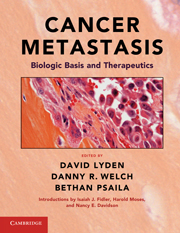Book contents
- Frontmatter
- Contents
- Contributors
- Overview: Biology Is the Foundation of Therapy
- PART I BASIC RESEARCH
- PART II CLINICAL RESEARCH
- 23 Introduction to Clinical Research
- 24 Sarcoma
- 25 Neuroblastoma
- 26 Retinoblastoma
- 27 Primary Brain Tumors and Cerebral Metastases
- 28 Head and Neck Cancer Metastasis
- 29 Cutaneous Melanoma: Therapeutic Approaches for Metastatic Disease
- 30 Gastric Cancer Metastasis
- 31 Metastatic Pancreatic Cancer
- 32 Metastasis of Primary Liver Cancer
- 33 Advances in Management of Metastatic Colorectal Cancer
- 34 Lung Cancer Metastasis
- 35 Metastatic Thyroid Cancer: Evaluation and Treatment
- 36 Metastatic Renal Cell Carcinoma
- 37 Bladder Cancer
- 38 Bone Complications of Myeloma and Lymphoma
- 39 Breast Metastasis
- 40 Gynecologic Malignancies
- 41 Prostate Cancer Metastasis: Thoughts on Biology and Therapeutics
- 42 The Biology and Treatment of Metastatic Testicular Cancer
- 43 Applications of Proteomics to Metastasis Diagnosis and Individualized Therapy
- 44 Critical Issues of Research on Circulating and Disseminated Tumor Cells in Cancer Patients
- 45 Lymphatic Mapping and Sentinel Lymph Node Biopsy
- 46 Molecular Imaging and Metastasis
- 47 Preserving Bone Health in Malignancy and Complications of Bone Metastases
- 48 Role of Platelets and Thrombin in Metastasis
- THERAPIES
- Index
- References
33 - Advances in Management of Metastatic Colorectal Cancer
from PART II - CLINICAL RESEARCH
Published online by Cambridge University Press: 05 June 2012
- Frontmatter
- Contents
- Contributors
- Overview: Biology Is the Foundation of Therapy
- PART I BASIC RESEARCH
- PART II CLINICAL RESEARCH
- 23 Introduction to Clinical Research
- 24 Sarcoma
- 25 Neuroblastoma
- 26 Retinoblastoma
- 27 Primary Brain Tumors and Cerebral Metastases
- 28 Head and Neck Cancer Metastasis
- 29 Cutaneous Melanoma: Therapeutic Approaches for Metastatic Disease
- 30 Gastric Cancer Metastasis
- 31 Metastatic Pancreatic Cancer
- 32 Metastasis of Primary Liver Cancer
- 33 Advances in Management of Metastatic Colorectal Cancer
- 34 Lung Cancer Metastasis
- 35 Metastatic Thyroid Cancer: Evaluation and Treatment
- 36 Metastatic Renal Cell Carcinoma
- 37 Bladder Cancer
- 38 Bone Complications of Myeloma and Lymphoma
- 39 Breast Metastasis
- 40 Gynecologic Malignancies
- 41 Prostate Cancer Metastasis: Thoughts on Biology and Therapeutics
- 42 The Biology and Treatment of Metastatic Testicular Cancer
- 43 Applications of Proteomics to Metastasis Diagnosis and Individualized Therapy
- 44 Critical Issues of Research on Circulating and Disseminated Tumor Cells in Cancer Patients
- 45 Lymphatic Mapping and Sentinel Lymph Node Biopsy
- 46 Molecular Imaging and Metastasis
- 47 Preserving Bone Health in Malignancy and Complications of Bone Metastases
- 48 Role of Platelets and Thrombin in Metastasis
- THERAPIES
- Index
- References
Summary
Colorectal cancer (CRC) is the third most common type of cancer and has the second highest cancer-related mortality among men and women in the United States. In 2009, approximately 150,000 Americans were expected to be diagnosed with colorectal cancer, and about 50,000 people were expected to die from the disease [1]. Despite the improvement in early detection through tests including fecal occult blood testing, double-contrast barium enema, flexible sigmoidoscopy, and screening colonoscopy, about 20 percent of patients with CRC are found to have metastases at the time of presentation [2]. Liver metastases are seen in about 20 percent to 70 percent of patients with metastatic CRC (mCRC) [3]. When patients present with isolated and limited liver metastases, surgical resection of the liver metastases can provide long-term survival; however, only 10 percent to 20 percent of patients with mCRC are eligible for curative liver resection [4]. The majority of patients with mCRC will receive systemic chemotherapy and palliative liver-directed therapy.
During the past decade, the development of effective chemotherapies such as irinotecan and oxaliplatin and the development of agents targeting the vascular endothelial growth receptor (VEGFR) and the epidermal growth factor receptor (EGFR) have made a tremendous impact on prolonging survival in patients with mCRC. Since the early 1990s, the median survival for a patient with unresectable mCRC has improved from six months with best supportive care to more than two years with current treatments (Figure 33.1).
- Type
- Chapter
- Information
- Cancer MetastasisBiologic Basis and Therapeutics, pp. 356 - 368Publisher: Cambridge University PressPrint publication year: 2011



